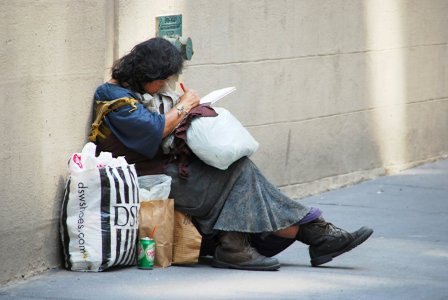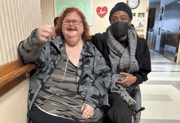Second chances start here: Couple transforms historic home for women in need
- Replies 0
When Richard and Jan Gould retired to Hobart, they probably imagined a peaceful life filled with strolls along the Derwent, cups of tea, and the odd spot of gardening.
But instead, this compassionate couple has found themselves at the heart of a movement to tackle one of Tasmania’s most pressing issues: homelessness among older women.
It all started when the Goulds, after moving from Sydney three years ago, began offering short-term accommodation to women in need at a property they owned.
What began as a simple act of kindness soon opened their eyes to the harsh reality facing many older women in Australia—women from all walks of life, suddenly unable to afford skyrocketing rents, and finding themselves with nowhere to go.
‘We haven’t done this sort of thing before,’ Jan admits, but the stories they heard from their guests—some staying a week, others for months—moved them deeply.
The common thread? A lack of affordable housing, and a social safety net that too often leaves older women behind.

When a 10-bedroom, five-bathroom former student boarding house in South Hobart came up for sale, the Goulds had a lightbulb moment.
‘It took us a little while, and all of a sudden the penny dropped,’ Richard recalls. ‘This could make a great affordable housing property, and specifically for women. It was a no-brainer.’
So, with savings from their superannuation, they bought the property—formerly part of the University of Tasmania’s Jane Franklin Hall—and set about transforming it into a haven for women at risk of homelessness.
They’ve named it Blue Sky House, a nod to the hope and new beginnings they want to offer.
The Goulds are determined that Blue Sky House will be more than just a roof over someone’s head.
‘We want people to be glad to come home,’ Jan says. The house will offer private living spaces for up to 10 women, along with communal areas designed to foster connection and support—a place where residents can form a ‘sisterhood’ and rebuild their lives.
While most residents are expected to stay medium to long term, the Goulds also anticipate some will need shorter stays. The stability of secure, affordable housing, they believe, is the first step in helping women recover from trauma and regain their independence.
‘It will take them out of what is a very dark place and bring them into an area we are calling Blue Sky,’ Richard says. ‘My wife likes to think it’s going to become a sisterhood.’
Source: The Project / Youtube.
Of course, turning a former boarding house into a welcoming home is no small feat.
The Goulds are working closely with charities and social housing experts to ensure they’re meeting the real needs of the women they hope to help. There’s still plenty to do—council approvals, renovations, and the hunt for preloved furniture and household items.
But they’re not alone. The local community has rallied around the project, with members of the Good Karma Network volunteering their skills and local businesses considering sponsorships.
An architect, a builder, and a gardener have all offered their services, touched by the Goulds’ vision.
‘It’s very heartwarming,’ Richard says. ‘We’ve got to take responsibility for what’s happening in our community. At the end of the day, it’s not what you have, it’s what you do with what you’ve got.’
While the Goulds’ generosity has been widely praised, their story also raises important questions. Ewan Higgs from Hobart City Mission admires their efforts but wonders why retirees are dipping into their super to provide what should be an essential service.
‘Should we be expecting people to do that?’ he asks. ‘Having a roof over your head is only one part of the puzzle. There are other complex issues that have led someone to homelessness.
What we need is a whole-government response that not only pulls in housing but also looks to pull in criminal justice and health. It can’t just be a housing response. Homelessness needs to be a health response as well.’
Source: 10 News / Youtube.
Sadly, the Goulds’ experience reflects a growing crisis across Australia. Older women are the fastest-growing group of homeless people in the country, often due to a combination of factors: relationship breakdown, job loss, age discrimination, and a lack of affordable housing.
Many have spent years caring for others, only to find themselves with little superannuation and few options when life takes an unexpected turn.
The statistics are sobering, but stories like the Goulds’ remind us that change is possible—especially when communities come together.
The Goulds are still on the lookout for donations of furniture, household goods, and support from local businesses. If you’re in the Hobart area and have something to offer, why not reach out? Even a small gesture can make a big difference.
Read more: ‘This is not how I want to see the end of my life’: The shocking truth about pensioners’ housing struggles

Have you or someone you know faced housing insecurity later in life? What do you think needs to change to better support older Australians, especially women, at risk of homelessness? Do you have ideas for how communities can step up—or stories of kindness to share? We’d love to hear your thoughts and experiences in the comments below!
But instead, this compassionate couple has found themselves at the heart of a movement to tackle one of Tasmania’s most pressing issues: homelessness among older women.
It all started when the Goulds, after moving from Sydney three years ago, began offering short-term accommodation to women in need at a property they owned.
What began as a simple act of kindness soon opened their eyes to the harsh reality facing many older women in Australia—women from all walks of life, suddenly unable to afford skyrocketing rents, and finding themselves with nowhere to go.
‘We haven’t done this sort of thing before,’ Jan admits, but the stories they heard from their guests—some staying a week, others for months—moved them deeply.
The common thread? A lack of affordable housing, and a social safety net that too often leaves older women behind.

A retired Hobart couple, Richard and Jan Gould, have purchased a former student boarding house to provide low-rent accommodation for older women at risk of homelessness, using their superannuation savings. Image source: Ilse Orsel / Unsplash. Disclaimer: This is a stock image used for illustrative purposes only and does not depict the actual person, item, or event described.
When a 10-bedroom, five-bathroom former student boarding house in South Hobart came up for sale, the Goulds had a lightbulb moment.
‘It took us a little while, and all of a sudden the penny dropped,’ Richard recalls. ‘This could make a great affordable housing property, and specifically for women. It was a no-brainer.’
So, with savings from their superannuation, they bought the property—formerly part of the University of Tasmania’s Jane Franklin Hall—and set about transforming it into a haven for women at risk of homelessness.
They’ve named it Blue Sky House, a nod to the hope and new beginnings they want to offer.
The Goulds are determined that Blue Sky House will be more than just a roof over someone’s head.
‘We want people to be glad to come home,’ Jan says. The house will offer private living spaces for up to 10 women, along with communal areas designed to foster connection and support—a place where residents can form a ‘sisterhood’ and rebuild their lives.
While most residents are expected to stay medium to long term, the Goulds also anticipate some will need shorter stays. The stability of secure, affordable housing, they believe, is the first step in helping women recover from trauma and regain their independence.
‘It will take them out of what is a very dark place and bring them into an area we are calling Blue Sky,’ Richard says. ‘My wife likes to think it’s going to become a sisterhood.’
Source: The Project / Youtube.
Of course, turning a former boarding house into a welcoming home is no small feat.
The Goulds are working closely with charities and social housing experts to ensure they’re meeting the real needs of the women they hope to help. There’s still plenty to do—council approvals, renovations, and the hunt for preloved furniture and household items.
But they’re not alone. The local community has rallied around the project, with members of the Good Karma Network volunteering their skills and local businesses considering sponsorships.
An architect, a builder, and a gardener have all offered their services, touched by the Goulds’ vision.
‘It’s very heartwarming,’ Richard says. ‘We’ve got to take responsibility for what’s happening in our community. At the end of the day, it’s not what you have, it’s what you do with what you’ve got.’
While the Goulds’ generosity has been widely praised, their story also raises important questions. Ewan Higgs from Hobart City Mission admires their efforts but wonders why retirees are dipping into their super to provide what should be an essential service.
‘Should we be expecting people to do that?’ he asks. ‘Having a roof over your head is only one part of the puzzle. There are other complex issues that have led someone to homelessness.
What we need is a whole-government response that not only pulls in housing but also looks to pull in criminal justice and health. It can’t just be a housing response. Homelessness needs to be a health response as well.’
Source: 10 News / Youtube.
Sadly, the Goulds’ experience reflects a growing crisis across Australia. Older women are the fastest-growing group of homeless people in the country, often due to a combination of factors: relationship breakdown, job loss, age discrimination, and a lack of affordable housing.
Many have spent years caring for others, only to find themselves with little superannuation and few options when life takes an unexpected turn.
The statistics are sobering, but stories like the Goulds’ remind us that change is possible—especially when communities come together.
The Goulds are still on the lookout for donations of furniture, household goods, and support from local businesses. If you’re in the Hobart area and have something to offer, why not reach out? Even a small gesture can make a big difference.
Read more: ‘This is not how I want to see the end of my life’: The shocking truth about pensioners’ housing struggles
Key Takeaways
- A retired Hobart couple, Richard and Jan Gould, have purchased a former student boarding house to provide low-rent accommodation for older women at risk of homelessness, using their superannuation savings.
- The ten-bedroom property, now called Blue Sky House, is intended to feel like a home and aims to offer both private living spaces and communal areas, with hopes to open to residents by October.
- While local charities have praised the Goulds’ efforts, concerns have been raised about whether it’s appropriate for private citizens to provide services that are typically the responsibility of government.
- The project has sparked a positive response from the local community, with offers of support and donations, highlighting both the scale of the housing crisis and the power of community action.
Have you or someone you know faced housing insecurity later in life? What do you think needs to change to better support older Australians, especially women, at risk of homelessness? Do you have ideas for how communities can step up—or stories of kindness to share? We’d love to hear your thoughts and experiences in the comments below!







